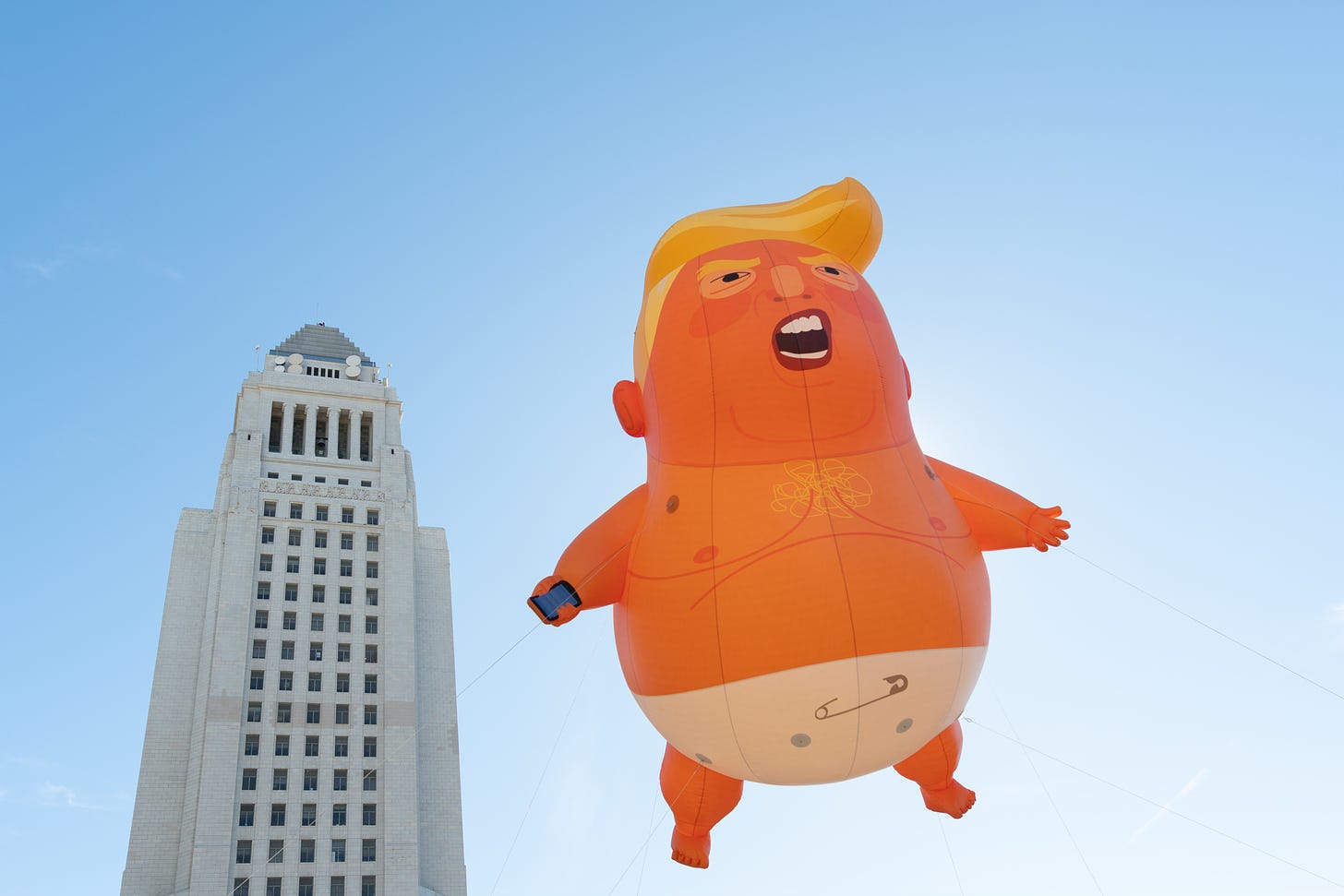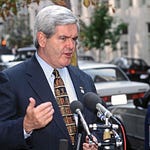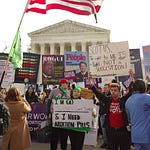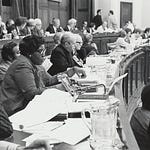A Trump baby balloon at the third Womens March, Los Angeles, January 19, 2019. Photo credit: betto rodrigues/Shutterstock
Near the end of Donald J. Trump’s first year in office, the New York Times ran a story about his typical day. It began at around 5:30 am with a frenzy of television watching and channel switching. After a few hours of this, Maggie Haberman, Glenn Thrush, and Peter Baker wrote, Trump would start Tweeting. “Sometimes he tweets while propped on his pillow,” the reporters wrote, citing anonymous aides. “Other times he tweets from the den next door, watching another television. Less frequently, he makes his way up the hall to the ornate Treaty Room, sometimes dressed for the day, sometimes still in night clothes, where he begins his official and unofficial calls.”
Trump had very little interest in policy, couldn’t focus, and wandered off the teleprompter for minutes at a time when giving speeches. For the first time in history, anonymous aides began referring to the President as a child who had to be humored and cajoled. The people around him—at least, the ones who were not delusional or crooked—were referred to in the press as “the adults in the room,” who maintained “guardrails.”
What frustrated the President—now, we are talking about the same man who went to his office in his pajamas—was his belief that he wasn’t being taken seriously. And yet, if that was true, even family and close friends had reasons for that. There were abundant rumors that Trump flew into petulant rages when he was thwarted, and that there were favorites, like 20-something aide Hope Hicks, whose main job seemed to be to soothe him.
Then there was Trump’s narcissism. He didn’t read anything but complimentary stories about himself, stories provided by a staff anxious that he stay in a good mood. White House sources explained that the President liked to think of himself, not as the leader of the free world, but as a character in a television show. Who knows—maybe he thought that the 1998 Jim Carrey movie, The Truman Show, was really about President Harry S Truman?
I’m just kidding. I’m sure Trump was speaking metaphorically--a word I have never heard him use and that has lots of syllables. But there were other things about Trump that the fishbowl of the White House revealed: that he guzzled dozens of Diet Cokes a day, was a picky eater when he couldn’t have his favorite foods from McDonalds and found it impossible to focus for more than a minute at a time. He flushed documents he didn’t like down the toilet, causing epic clogs—and, incidentally, violating the 1978 Presidential Records Act.
Then, things got crazier. In December 2020, Trump was having an epic meltdown from having lost the election--the one that resulted in an armed mob storming the Capitol on January 6, 2021-- Comedy Central produced a sketch that put a Trump impersonator in a room with a dozen toddlers, an aide, and a bunch of bouncy balls.
Well, he’s back, more incoherent and impulsive than ever; and this time, we are told, there are no more adults in the room. It’s going to be just a big White House full of impulsive, grandiose, lying children breaking shit. I’m not taking this lightly, listeners, but I do need to take a minute and be straight with you: our best-case scenario for the next four years is that our government is so labyrinthine and complex that these folks won’t be able to find a paperclip, much less make what might, under other circumstances and in other hands, be welcome reforms.
That’s why I invited international relations scholar Dan Drezner on the show. In 2017, Dan started to notice the large numbers of people—journalists, anonymous aides, other politicians—who openly compared Donald Trump, a man in his seventies, to a toddler. He started threading tweets on the platform now called X and started reading up on toddler psychology. The result was his 2020 book The Toddler-In-Chief: What Donald Trump Teaches Us About the Modern Presidency (University of Chicago Press.)
Dan is the first in a series of guests I will have in the coming months who published books about Trump’s first term I want to revisit or, in some cases, read for the first time.
We know what’s coming, and we need help thinking about it.
Show notes:
CNN commenter Van Jones argued that Donald Trump had grown into the Presidency on March 1, 2017, when he honored the widow of a Navy SEAL; Washington Post journalist Fareed Zakaria got on board a month later, when Trump launched missiles into Syria.
Dan mentions a September 5, 2028 opinion piece in The New York Times alerting the public to Trump’s bizarre executive style, and how aides across government were attempting to thwart him.
Dan reminds Claire about some of Trump’s odder, first-term ideas. On August 25, 2019, Axios’s Jonathan Swan and Margaret Talev reported that “President Trump has suggested multiple times to senior Homeland Security and national security officials that they explore using nuclear bombs to stop hurricanes from hitting the United States.” A year later, he suggested swapping Puerto Rico for Greenland.
Dan’s research included the American Academy of Pediatrics, Caring for Your Baby and Young Child: Birth to Age 5, now in its eighth edition.
Claire notes that, ten years after his emergence as a politician, journalists still seem unsure how to cover him.
Women who have complained of being sexually assaulted by Trump often report that he grabs at and paws them like child might; here is a collated list of those charges by Mariel Padilla at The 19th. (October 26, 2023)
Claire floated the idea that Trump can’t read, while Dan says he probably can—but can’t focus long enough to read seriously. David A. Graham wrote about Trump’s “indifference to the printed word” in The Atlantic (January 5, 2018.).
Dan recommends · Elizabeth Saunders, “No Substitute for Experience: Presidents, Advisers, and Information in Group Decision Making,” International Organization (April, 2017).
Claire mentions Mary Trump’s psychological portrait of her Uncle Donald, Too Much and Never Enough: How My Family Created the World's Most Dangerous Man (Simon & Schuster, 2020).
Claire notes that, in retrospect, the White House media knew President Joe Biden was failing and did not report the story: then-New York magazine political reporter Olivia Nuzzi called it a “conspiracy of silence.” Dan notes that owners of major publications have an even greater incentive to not cover any age-related decline that Donald Trump may suffer..
Asked to recommend more readings for our listeners, Dan suggests his own The Ideas Industry: How Pessimists, Partisans, and Plutocrats are Transforming the Marketplace of Ideas (Oxford, 2017), Alexis De Tocqueville’s Democracy In America (1835, 1840), and Jill Lepore’s These Truths: A History of the United States (W.W. Norton, 2018).
You can download this podcast here or subscribe for free on Apple iTunes, Spotify, Google Podcasts, or Soundcloud. You can also keep up with Political Junkie content and watch me indulge my slightly perverse sense of humor on Bluesky, Instagram, Threads, YouTube, and TikTok.
You can follow Dan on his podcast with Ana Marie Cox, The Churn, or at his Substack, Drezner’s World.
If you enjoyed this episode, why not try:
Episode 55, The Ten-Dollar Founding Father: Chatting with historian William Hogeland about Alexander Hamilton, debt, taxes, visionaries, and his new book, "The Hamilton Scheme: An Epic Tale of Money and Power in the American Founding.”
Episode 51, MAGA Is the Newest, and Oldest, American Myth: A conversation with American Studies scholar Richard Slotkin about his new book, "A Great Disorder: National Myth and the Battle for America."
Episode 41, Heather Cox Richardson Believes In You: A conversation about Richardson's book, "Democracy Awakening: Notes on the State of America,” Substack, and the importance of popular history.
And here’s a bonus: all new annual paid subscriptions include a free copy of my book about political media, Political Junkies: From Talk Radio to Twitter, How Alternative Media Hooked Us on Politics and Broke Our Democracy (Basic Books, 2020.)













Share this post